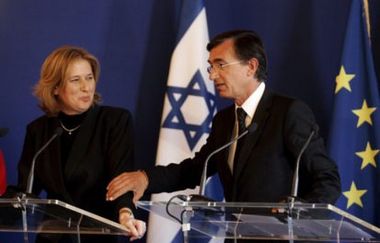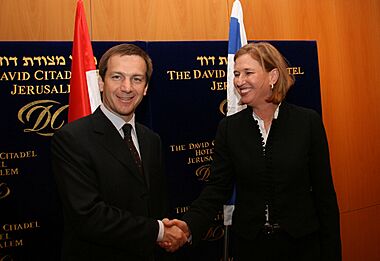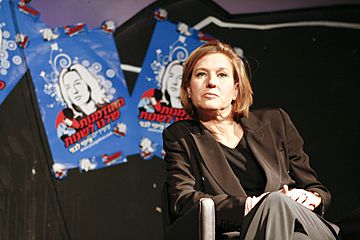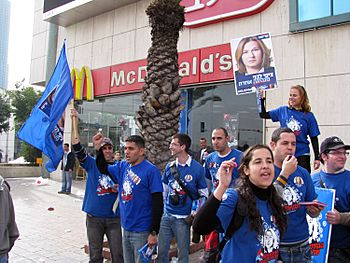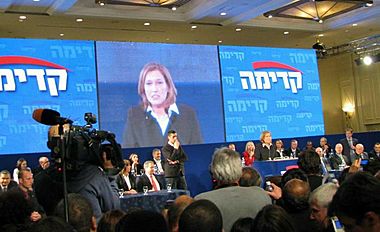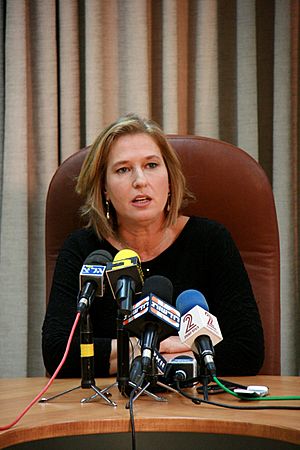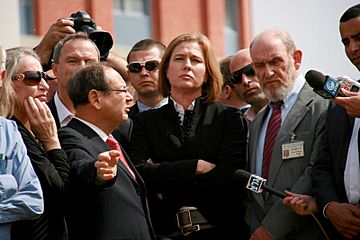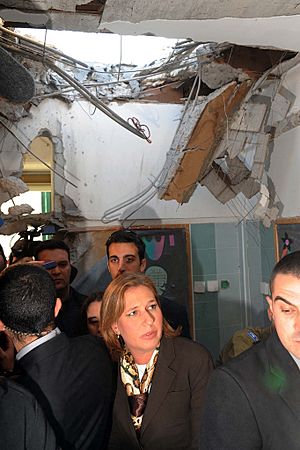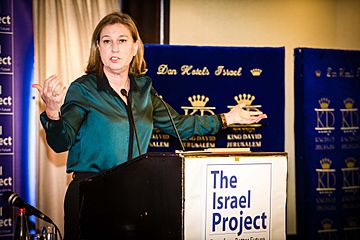Tzipi Livni facts for kids
Quick facts for kids
Tzipi Livni
|
|
|---|---|
|
ציפי לבני
|
|
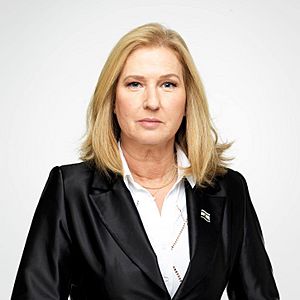 |
|
| Ministerial roles | |
| 2001 | Minister of Regional Cooperation |
| 2001–2002 | Minister without Portfolio |
| 2002–2003 | Minister of Agriculture |
| 2003–2006 | Minister of Immigrant Absorption |
| 2004–2005 | Minister of Housing and Construction |
| 2006–2007 | Minister of Justice |
| 2006–2009 | Minister of Foreign Affairs |
| 2013–2014 | Minister of Justice |
| 2013–2014 | Minister for the Promotion of the Diplomatic Process |
| Faction represented in the Knesset | |
| 1999–2005 | Likud |
| 2005–2012 | Kadima |
| 2013–2014 | Hatnua |
| 2014–2019 | Zionist Union |
| 2019 | Hatnua |
| Other roles | |
| 2009–2012 | Leader of the Opposition |
| 2018–2019 | Leader of the Opposition |
| Personal details | |
| Born | 8 July 1958 Tel Aviv, Israel |
| Spouse | Naftali Spitzer |
| Children | 2 |
| Parents | Eitan Livni Sara Rosenberg |
| Signature |  |
Tzipi Livni (born 8 July 1958) is an Israeli politician, diplomat, and lawyer. She was a member of the Knesset, which is Israel's parliament. Livni was a leader in the center-left political group.
Throughout her career, Livni held many important jobs. She served as Foreign Minister, Vice Prime Minister, Minister of Justice, and Leader of the Opposition. She is well-known for her efforts to find a peaceful solution to the Israeli–Palestinian conflict.
Many people consider Livni to be one of the most powerful women in Israel since Golda Meir. She has held eight different positions in the government, which is a record for an Israeli woman. She was the first woman to be Israel's Vice Prime Minister, Justice Minister, Agriculture Minister, and Housing Minister. Livni grew up in a family that supported right-wing politics. However, she became a strong supporter of a two-state solution. This solution aims to create a secure Israel and a Palestinian state. Livni was often called "Mrs. Clean" by her supporters. This nickname showed that people saw her as an honest politician.
From 2001 to 2009, Livni worked in the governments of Ariel Sharon and Ehud Olmert. She was especially important as Foreign Minister. During this time, she led many peace talks with the Palestinians. In 2008, Livni was ready to become Prime Minister. However, she could not form a government. The next year, her party won the most seats in the Knesset. But she was again prevented from becoming Prime Minister. This was because right-wing parties had more overall support. She then became the Leader of the Opposition from 2009 until she left the Knesset in 2012.
Later in 2012, Livni started a new political party called Hatnuah. She ran in the 2013 elections. After the elections, she became the Justice Minister. She again led new peace talks between Israelis and Palestinians. In 2014, Benjamin Netanyahu removed Livni from his government. This happened because of disagreements over policies. New elections were then called. In the 2015 election, Livni joined forces with Labor Party leader Isaac Herzog. They created a group called the Zionist Union. In 2019, Livni announced she was leaving politics. Her party, Hatnuah, also withdrew from the election.
Contents
- Early Life and Education
- Military Service and Intelligence Work
- Education, Family, and Legal Career
- Political Career
- 2006–2009: Foreign Minister of Israel
- 2008–2009: Candidate for Prime Minister
- 2009–2012: Leader of the Opposition
- 2012–2014: Hatnua Party
- 2014–2019: The Zionist Union
- After the Knesset
- Awards and Honors
- Affiliations
- Images for kids
- See also
Early Life and Education
Tzipi Livni was born in Tel Aviv, Israel. Her parents were Eitan Livni and Sara Rosenberg. Both of her parents were important members of the Irgun. This was a group that played a role in Israel's early history. After Israel became a state in 1948, her parents were the first couple to get married there. Her father was a chief operations officer for the Irgun.
As a child, Livni was part of the Betar youth movement. She also played basketball for a team called Elitzur Tel Aviv. Livni felt that her parents' contributions to Israel's founding were not fully recognized. She said her parents respected Arabs. They acted against the British army, not against civilians.
Military Service and Intelligence Work
Livni served in the IDF, which is Israel's military. She reached the rank of Lieutenant. In 1979, Livni started studying law at Bar-Ilan University. She paused her law studies in 1980 to join the Mossad. The Mossad is Israel's national intelligence agency. She worked for the Mossad from 1980 to 1984. She was between 22 and 26 years old during this time. She left the Mossad in 1984 to get married and finish her law studies.
Education, Family, and Legal Career
Livni earned her law degree (LL.B.) from Bar-Ilan University in 1984. She worked as a lawyer for about ten years. She focused on business law, public law, and real estate law. She began her public career in 1996.
Livni lives in Tel Aviv. She is married to Naftali Spitzer, who works in advertising. They have two children, Omri (born 1987) and Yuval (born 1990). Her husband has supported her political career from the beginning.
Livni is a vegetarian. She speaks Hebrew, English, and French. She lived in Paris for several years.
Her father, Eitan Livni, passed away in 1991. Her mother, Sara, passed away in 2007. Her mother supported Livni's decision to leave the Likud party. She also accepted Livni's support for the two-state solution.
Political Career
Livni started her political career in 1996. She ran for a spot on the Likud party's list for the Knesset. She was placed at number 36. Likud won 32 seats in the 1996 election, so she did not get into the Knesset. However, the new Prime Minister, Netanyahu, appointed her as director general of the government's corporations authority. In this role, she oversaw the sale of several government-owned companies to private owners.
Livni later felt that selling some companies and natural resources was not the best decision. In 2013, she said she was unsure if she would privatize certain companies today.
1999–2005: Likud Party
Livni was first elected to the Knesset in 1999 as a member of the Likud party. She did not immediately take a big role in making laws. When Ariel Sharon became prime minister in 2001, he gave her many jobs in his government. Her first job was Minister of Regional Co-operation. She held this role from March to August 2001. In December 2002, Sharon made her Minister of Agriculture. She held this job until February 2003. In 2003, Livni became Minister of Immigrant Absorption. She held this position until 2006. In 2004, Livni was appointed Minister of Housing and Construction. She held this job until 2005. After another party left the government, Sharon made her Justice Minister. In this role, Livni became more well-known. She was seen as an honest person who supported the law. This was especially true during cases of corruption involving other members of her party.
Livni strongly supported Sharon's plan to remove Israeli settlements from Gaza. She was seen as a moderate member of the Likud party. She often helped settle disagreements within the party. She was key in getting government support for the disengagement plan. She worked to achieve a two-state solution to the Israeli–Palestinian conflict. This included successfully getting the Knesset to approve the pullout from the Gaza Strip. In 2004, she received an award for "Quality of Governance."
2005–2012: Kadima Party
On 20 November 2005, Livni, along with Sharon and Ehud Olmert, formed the Kadima Party. Before the March 2006 elections, Livni became the new Foreign Minister. She also continued to serve as Justice Minister. This happened after many Likud Party members left the government.
For the March 2006 Knesset election, Livni was placed third on Kadima's list of candidates. This meant she was almost certain to be elected to the Knesset.
2006–2009: Foreign Minister of Israel
In 2006, Livni was appointed Israel's Minister of Foreign Affairs. She held this job until 2009. In Ehud Olmert's government, Livni was also named Designated Acting Prime Minister. This meant she would take the prime minister's place if they were away or unable to do their job. She stopped being Justice Minister at that time. But she held that position again from November 2006 to February 2007, while still serving as Foreign Minister.
As Foreign Minister, Livni was in charge of talks with the Palestinian Authority. During these talks, she suggested changing the future border between Israel and a Palestinian state. This idea would place some Israeli Arab towns within the Palestinian state. Her practical approach as foreign minister earned her much respect. This was true among diplomats in the US, Europe, and even Arab countries. This respect continued even after she left the position.
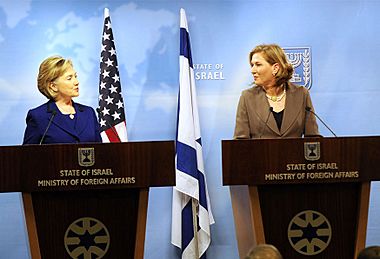
After the March 2006 Knesset election, she was called "the second most powerful politician in Israel." Livni is the second woman in Israel to be Foreign Minister, after Golda Meir. In 2007, Time magazine included her in its list of the 100 Most Influential People in the World. Forbes magazine also listed her as one of the most powerful women in the world.
Livni was the first Israeli government minister to clearly separate Palestinian attacks against military targets from terrorist attacks against civilians. In a TV interview in March 2006, Livni said, "Someone who is fighting against Israeli soldiers is an enemy and we will fight back, but I believe that this is not under the definition of terrorism, if the target is a soldier."
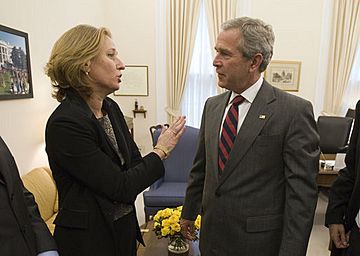
In 2007, she met with Palestinian prime minister, Salam Fayyad. They discussed how to improve the lives of the Palestinian people. They also talked about keeping Israel safe.
In May 2007, Livni called for Olmert to resign. This was after a report criticized Olmert for how he handled the Second Lebanon War in 2006. She offered to lead Kadima if Olmert stepped down. However, Olmert did not resign, and Livni stayed in the government.
2008–2009: Candidate for Prime Minister
Kadima Leadership Victory
Ehud Olmert announced he would resign as prime minister. This was due to several investigations. A Kadima leadership election was held on 17 September 2008. Livni and Shaul Mofaz were the main candidates. Livni won the Kadima leadership election by a very small number of votes. Palestinian peace negotiators were reportedly happy with her win.
Forming a Government
As the new leader of the ruling party, Livni was chosen to be the next prime minister. After winning, she said she felt a great responsibility.
On 21 September 2008, Olmert officially resigned. The next day, President Shimon Peres formally asked Livni to form a new government. Livni faced difficult talks with other parties needed to form a government. One party, Shas, had conditions. These included more money for religious communities and not discussing Jerusalem's status in peace talks. Livni was able to sign an agreement with the Labor party. However, on 26 October, she told the President she could not form a government. She suggested new elections. Livni said she would not give up her beliefs just to become prime minister. She stated, "I was willing to pay a price to form a government, but I was never willing to risk the political and economic future of Israel."
2009 Elections
In February 2009, Israel held elections for the Knesset. Livni, as head of the Kadima party, ran against Benjamin Netanyahu of the Likud party. Kadima won the most seats in the Knesset. However, right-wing parties gained enough seats that a government led by Kadima was unlikely. Because of this, President Shimon Peres asked Netanyahu and Likud to form a government. This was unusual because Likud had won one fewer seat than Kadima.
The New York Times praised Livni for "refusing the extortionist conditions set by Shas." The newspaper supported her for prime minister. It said Israelis had a clear choice between a leader who was brave enough to try new ideas and one who was not. The Israeli newspaper Haaretz also supported Livni for prime minister.
When Livni was asked to form the next government, many Arabs wanted her to be Israel's next prime minister. During the 2009 elections, Arab media showed her in a negative light. However, they still saw her as the better choice compared to others.
2009–2012: Leader of the Opposition
After the 2009 elections, Livni's Kadima party won the most seats. But they could not form a government. So, she led the party into opposition. She became Israel's first female Leader of the Opposition.
Livni spoke to students at Harvard University in May 2009. She said that on the issue of Iran, there was no disagreement in Israel. She explained that Iran was a threat to other countries in the region. She said Iran must be stopped from getting nuclear weapons.
Before Lebanon's 2009 elections, Livni agreed with a principle from U.S. President Barack Obama's speech in Cairo. She said that "Elections alone do not make true democracy." She wrote in The New York Times that some groups might use elections to push their violent goals. She suggested that the international community should have rules for parties running in elections. These rules would require parties to reject violence and use peaceful methods.
Livni supported Israel's gay community in June 2009. She spoke at an event in Tel Aviv. After an attack on a gay youth center in August 2009, Livni said the event should make society think. She called for a clear message against hate and violence. She attended a rally near the attack site. She urged the gay and lesbian community to continue living their lives. Livni was against Netanyahu's land reform bill.
On 8 October 2009, Yale University honored Livni as a Chubb Fellow. This was for her work and inspiration. She is the third Israeli leader to receive this honor. Former U.S. Presidents Jimmy Carter and Bill Clinton also received it. Livni talked about a report that accused Israel of war crimes in Gaza. She said there was a big difference between those who want to murder children and those who accidentally harm civilians used by terrorists. She said she regretted every civilian death. But she insisted that what happened at a UN school was not a mistake. Livni said that Israel is involved in the peace process for its own benefit. At her next stop in Miami, Livni received the International Hall of Fame Award.
As opposition leader, Livni said in a 2009 Knesset speech that she did not support Yitzhak Rabin's policies at the time. She said the debate was about keeping Israel as a Jewish state and also keeping all of the Land of Israel. Political experts saw Livni's speech at a 2003 memorial for Rabin as a turning point. She became more popular among those who supported peace. She gave a moving speech. She said the day Rabin was murdered was "the day that the skies fell down on me." As foreign minister, Livni attended the Rabin memorial again in 2009.
In December 2009, Livni traveled to Paris. She met with French president Nicolas Sarkozy. She told reporters that "Time is against us." She said they discussed the need to restart the peace process between Israel and the Palestinians. She believed it was in Israel's interest to restart the talks.
Leadership Defeat and Resignation
In November 2011, other candidates in Kadima called for a party election. They said Knesset elections were likely soon. On 19 January 2012, Livni set the election date for 27 March 2012. Livni lost by a large margin to Shaul Mofaz, a former defense minister. In May 2012, Livni resigned from the Knesset. She said she was not leaving public life. She stated that Israel was "too dear" to her. She commented on her decisions. She said she was not sorry for not giving in to political pressure. She also said she was not sorry for promoting the main issue she believed in. She added that even if the Israeli–Palestinian conflict was not popular, there was an urgent need for a lasting agreement.
2012–2014: Hatnua Party
2013 Elections
On 27 November 2012, Livni announced her new party, called Hatnua ("The Movement"). Seven members of the Knesset from the Kadima Party joined her. Former Labor Party leaders also joined.
Minister of Justice
After the 2013 elections, Hatnua won six seats in the Knesset. Livni did not recommend any candidate for prime minister to President Peres. After other party leaders supported Netanyahu, Livni led Hatnua to join a new government. This was the thirty-third government of Israel. According to the agreement, Livni became Justice Minister. She also became the chief negotiator with the Palestinian Authority. Environmental issues were important to Hatnua. So, Livni made sure her party got the environmental protection ministry. She appointed Amir Peretz to this role. As Justice Minister, Livni chaired the Ministerial Committee on Legislation. Netanyahu also unofficially asked Livni to manage Israel's diplomatic relations with the United States and Europe.
2013–14 Israeli–Palestinian Peace Talks
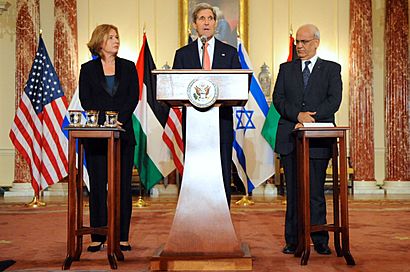
Livni led the Israeli team in the peace talks. These talks were arranged by U.S. Secretary of State John Kerry. The talks lasted from July 2013 to April 2014. When announcing the talks, Livni criticized the "cynicism and pessimism" around the peace process. She hoped the negotiators would turn a "spark of hope into something real and lasting." She said, "I believe that history is not made by cynics. It is made by realists who are not afraid to dream. And let us be these people." The talks ended in April 2014. This happened when Israel could not release a group of prisoners as promised. The Palestinians then joined several international agreements.
Dismissal from Government
Livni continued as Justice Minister until 2 December 2014. At that time, disagreements within the government became too big. Netanyahu fired Livni and Finance Minister Yair Lapid. He accused them of trying to overthrow the government. Livni and Lapid had often criticized government decisions. Netanyahu said this made it "impossible to govern." Netanyahu was especially frustrated by Livni's control of the ministerial committee on legislation.
2014–2019: The Zionist Union
2015 Elections
After the Knesset was dissolved in December 2014, Labor leader Isaac Herzog and Livni announced a joint list. This list was between Labor and Hatnua. It was called the Zionist Union. They ran in the 2015 elections to try to prevent Netanyahu from getting a fourth term as prime minister. They suggested sharing the role of prime minister if they won enough votes. This arrangement is known as rotation. Livni also said she would step back if her involvement made it hard to form a government. The partnership between Livni and Herzog created excitement. It encouraged center-left voters in Israel. They saw the partnership as a real chance to defeat Netanyahu.
Many opinion polls during the campaign showed a close race. Some polls suggested Livni and Herzog had taken the lead. Initial exit polls showed they won 27 seats. But the final count showed the Zionist Union won only 24 seats, while Likud won 30. After the elections, Livni and the Zionist Union became the opposition.
Leader of the Opposition
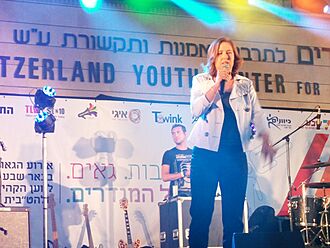
Livni was a member of the Knesset Foreign Affairs and Defense Committee. She also served on the Constitution, Law and Justice Committee. In August 2015, Livni started a new subcommittee. It focused on how international law was used in the Israeli–Palestinian conflict. She chaired this committee. Livni said that this "lawfare" was a "war front as any other." The committee's goal was to defend Israel and change international trends against it.
In February 2017, it was reported that UN Secretary-General António Guterres offered Livni a high position at the UN. However, this did not happen.
Party Split and Retirement
On 1 January 2019, at a televised meeting, Labor leader Avi Gabay announced that Labor would not run with Hatnua in the April 2019 Israeli legislative election. This surprised Livni. Polls showed that Hatnua was not likely to win enough votes to enter the Knesset. On 18 February 2019, Livni announced she was retiring from politics. Hatnua also withdrew from the election. This was to avoid splitting the votes of center-left parties.
After the Knesset
In September 2019, Livni became a Fisher Family Fellow at Harvard Kennedy School.
Livni praised Joe Biden's victory in the 2020 United States presidential election. She said Biden is committed to democratic principles. She called his election "a blessing" for the United States, Israel, and the free world.
In a May 2024 interview, Livni urged the Israeli government to plan for how Gaza would be governed after the Gaza war. She warned that delays in working with Arab partners could be a costly mistake.
On 11 July 2024, The Jerusalem Post reported that Yair Golan, leader of a new party called Democrats, was thinking about appointing Livni to a high position in his party.
On 9 December 2024, Livni spoke at an event in Melbourne. This was days after a synagogue attack in the city. She confirmed her support for Israel to work with regional partners on Gaza's future. She rejected ideas for Israeli resettlement in Gaza. She believed it was "against the interest of Israel." About returning to politics, she said that "for me, politics is not the place to be." But she added that she would continue to "speak up for [her] beliefs" and "hope that it makes a difference."
Awards and Honors
- 2004: Knight of Quality Government Award
- 2004: Abirat Ha-Shilton ("Quality of Governance") award.
- 2009: Honored by Yale University as a Chubb Fellow.
- 2009: International Hall of Fame Award from the International Women's Forum.
- 2018: Golden Arrow Award
Affiliations
- A board member of the International Crisis Group
- A member of The Aspen Ministers Forum
- A member of the international group of leaders who wrote the Declaration of Principles for Freedom Prosperity and Peace.
- Senior fellow at Harvard Kennedy School
- Global steering committee of "Campaign for nature" (founded by Wyss Foundation)
Images for kids
See also
 In Spanish: Tzipi Livni para niños
In Spanish: Tzipi Livni para niños
 | Toni Morrison |
 | Barack Obama |
 | Martin Luther King Jr. |
 | Ralph Bunche |


